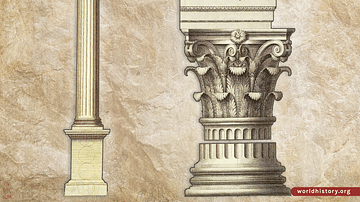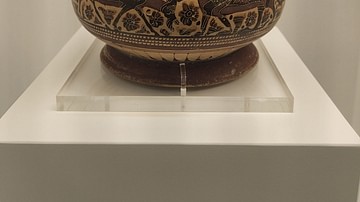Search
Search Results

Article
The Delian League, Part 3: From the Thirty Years Peace to the Start of the Ten Years War (445/4–431/0 BCE)
This text is part of an article series on the Delian League. The third phase of the Delian League begins with the Thirty Years Peace between Athens and Sparta and ends with the start of the Ten Years War (445/4 – 431/0 BCE). The First Peloponnesian...

Article
Civil War Generals in the Mexican-American War - Friends Who Became Enemies
In 1846, graduates of West Point Military Academy were deployed to fight in the Mexican-American War (1846-1848). Less than 20 years later, many now wearing different uniforms, they would meet again as adversaries in the American Civil War...

Image
The Corinthian Order, Classical Orders of Architecture
The Classical Orders of Architecture (Doric, Ionic, Corinthian, Tuscan, and Composite), originating in ancient Greece and refined by the Romans, are fundamental design principles that significantly influence classical and neoclassical structures...

Image
Corinthian Black-Figure Pyxis
This black-figure pyxis is decorated with ibexes and felines. This type of vessel was used as a container for cosmetics or jewellery. The decorative subjects, the elongation of the body of the animals and the schematisation of the filling...

Article
Paul's Journeys and the Mediterranean Trade
Mediterranean trade increased exponentially at the turn of the first millennium. During Rome's zenith, goods of all sorts began to move in all directions. As a common traveler aboard merchant ships, Paul traveled within such a milieu. Tracing...

Image
Corinthian Helmet (Detail)
Detail of a Corinthian helmet, from the second half of the 6th century BCE. The decoration of the helmet suggests that it may have been produced in central Italy. Louvre Museum, Paris, France.

Definition
American Civil War - The Birthpangs of the United States
The American Civil War (1861-1865) was the pivotal event in United States history and the largest armed conflict in the Western world following the end of the Napoleonic Wars (1815) and prior to the beginning of the First World War (1914...

Definition
Russian Civil War - The Failed Fightback Against Bolshevism
The Russian Civil War (1917-22) began shortly after the Bolshevik Revolution of November 1917. The Bolsheviks (the Reds) immediately found themselves in conflict with various opposition forces who disagreed with Bolshevik policies like abolishing...

Definition
War of 1812
The War of 1812 (1812-1815), referred to by some contemporaries as the Second American Revolution, was fought between the United States and the United Kingdom. Often remembered only as a sideshow to the Napoleonic Wars, the war had some long-term...

Definition
Peloponnesian War
The Peloponnesian War between Athens and Sparta and their respective allies came in two stages: from c. 460 to 446 and from 431 to 404 BCE. With battles at home and abroad, the long and complex conflict was damaging to both sides. Sparta...